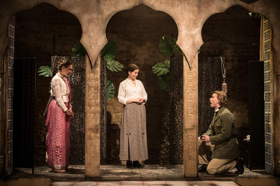Review: OTHELLO, Union Theatre

![]() Yesterday, I wrote a review of my least favourite Shakespeare - the frankly dreadful, no matter how impressive the staging nor how smart the interpretation, The Taming of the Shrew. The thought inevitably crossed my mind, "Is ol' Shakey as good as he's cracked up to be?"
Yesterday, I wrote a review of my least favourite Shakespeare - the frankly dreadful, no matter how impressive the staging nor how smart the interpretation, The Taming of the Shrew. The thought inevitably crossed my mind, "Is ol' Shakey as good as he's cracked up to be?"
Later, I watched this clip from Anderson Cooper's show on CNN, in which retired Lt. Col. Ralph Peters excoriates President Trump for his relentless attacks on the late senator and war hero, Captain John McCain. The motive for this unprecedented display of personal animus was, with some justification, said to be jealousy.
Ol' Shakey was there first of course, in what I consider to be his greatest work - Othello, the tale of a great man brought down by the amoral cunning of one far his inferior, a man driven mad by jealousy. And they say that Arts education is not what the country needs?
Director, Phil Willmott, has shifted the action to the dog days of the Raj, 1919 in Amritsar, scene of the Jallianwala Bagh Massacre. Othello is a Sikh general in the British Army conducting his own prayers while the Brits sing "Jerusalem"; his hair uncut as his religion demands, but his uniform that of the occupying forces; his wife's skin as alabaster white as his is Punjabi brown. Desdemona also professes two identities - her clothes a combination of starched white English linen and ornate, colourful sari silks, the daughter of an English Duke and the wife of a Sikh.
Between them comes Iago, the orderly, the little man who burns with resentment towards Othello, envious of his wife, his achievements, his intelligence, his bearing... Spying a fatal weakness - that Othello, like many people of high intelligence, lacks judgement - Iago hatches a plot to bring him down. If Iago cannot be Othello, then neither will Othello be Othello.
Rikki Lawton gives his Iago the ready smile, the darting eyes and unmitigated malevolence that makes the monster all the more dangerous for his surface decency. Sure he slumps his shoulders a little on being told to fetch and carry and sure his eyes and, sometimes, his hand, may linger a little in the presence of Desdemona, but only his wife, Claire Lloyd's sensible but outmanoeuvred Emilia, sees his true nature.
Matthew Wade and Carlotta De Gregori make a handsome doomed couple, Wade curdling his love to hate without ever suggesting that he's lost control - his agonising over his murderous intent all the more chilling for its absence of rage. De Gregori captures the wilful assertiveness Desdemona needs to reject social norms in marrying Othello, but we never think that she should have seen her doom coming. She loved him and that was enough until the very end.
There's fine support throughout the cast, particularly from Maximilian Marston as the dissolute Roderigo and Jerome Dowling as Michael Cassio, the unwitting agent of Iago's dreadful scheme.
Though Othello's psychological acuity is unparalleled, its language is not far behind in its glorious invention. Time after time, Shakespeare finds or invents the right words, the right simile, the right tone to explore the vulnerabilities of the human condition, giving us both the insight and the means to express it all in one. Quite the achievement.
If there's a little too much shouting in the final scene for my taste and if some of the speeches are a little too intimate to hear clearly at times, there's a beautiful set and splendid multi-sensory evocation of the Raj to enjoy. And you do need to concentrate - the pace is relentless, but so too is the beauty of the language and the compelling examination of human frailty in the face of determined evil.
And, a mere click away from here, our Iagos and Othellos are playing out their destructive games of ambition and amorality - for those with eyes to see.
Othello continues at the Union Theatre until 6 April.
Photo Scott Rylander
Reader Reviews

Videos
